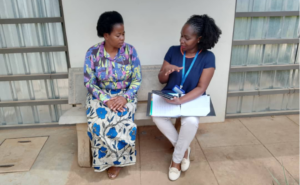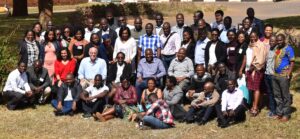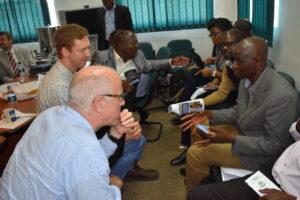A new study published in Lancet-Global Health introduces the results of a five-year trial in Malawi that tested two implementation strategies for integrating mental health with general medical care. Led by Bradley Gaynes and Brian Pence, the study includes a cost-effectiveness analysis that will help inform scale-up decisions about the relative benefits of implementing each strategy. The following introduces a case study for one of the strategies, using a mental health champion. Find the published study here.
When a young woman named Chimwenwe arrived at Malawi’s Kamuzu Hospital for prenatal care, she was joyful and preparing for a new baby. But she left with an unexpected HIV diagnosis. The life-altering news put her on a path to depression marked by sadness, and a dark mood interfered with daily life.
At a follow-up visit, Chimwenwe was screened for a new mental health study led by researchers with Kamuzu University of Health Sciences, the Institute for Global Health and Infectious Diseases at the UNC School of Medicine and UNC Project-Malawi in partnership with the Malawi Ministry of Health.

Building on UNC Project-Malawi’s long-term HIV research investments, the team’s studies began to address a critical need for depression treatment in HIV care in 2016. Since then, their work has steadily expanded into a series of mental health projects that are testing different strategies to make mental health care accessible for everyone. This includes the Friendship Bench, which trains community volunteers with no prior medical experience to offer talk therapy.
Depressive disorders represent a major source of global disease burden. While the U.S. may struggle to meet the need for quality mental health care, people in low- and middle-income countries often have no access to care at all. Left untreated, the condition can become disabling and even fatal. Malawi is a country of 20 million, with five psychiatrists and only a handful of mental health professionals. Researchers are rethinking mental health care to meet the scale and need.

“IGHID is proud to partner with Malawian researchers, academics and policy makers to re-imagine mental health care for Malawi,” said investigator Dr. Bradley Gaynes. Gaynes leads WARMHEART, a mental health training program funded through the National Institutes of Health’s Fogarty International Center, with Dr. Kazione Kulisewa, the first Malawian doctor trained as a psychiatrist in decades. Kulisewa now heads Kamuzu’s Psychiatry and Mental Health Department, which is training a new generation of psychiatrists.
Engaged partnership with the Malawian Ministry of Health’s noncommunicable diseases and mental health division has advanced meaningful policy changes in Malawi. Health policy now prioritizes the integration of mental health care into general medical care. In support, the Malawi Health System’s human resources department has created the first team of psychosocial counselors.

“The Friendship Bench initiative as part of treatment provides the necessary evidence for strategy and policy direction, for introducing psychosocial counseling to different service delivery areas,” said Michael Udedi, assistant director of the Ministry of Health’s curative and rehabilitative services.
IGHID Investigator Brian Pence says the team is developing and testing mental health interventions that will go beyond HIV. “We are learning how to integrate mental health into general care for adolescents, pregnant women, older adults with chronic illness, and people with severe mental illness.”
Malawi research coordinator and Friendship Bench master trainer Steve Mphonda sees results with each client who goes through the program.
“Friendship Bench provides a safe space for people to express their feelings without being judged. The service is becoming increasingly popular, praised for its innovative support and education about mental health, while creating a sense of community that connects people,” he says.
Chimwemwe participated in six sessions of Friendship Bench, and the experience destigmatized everything she had known about HIV. Today, she feels empowered to take responsibility for her psychological well-being and she expresses gratitude.
“I have stopped having bad thoughts, and I have learned how to rely on myself and solve problems. The experience has helped me get back to old friends, it brought peace to my family and focus to my HIV care,” she says.
